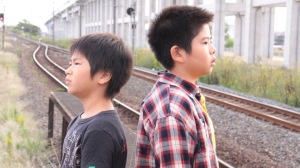The trials and tribulations of children within the family unit has long been a potent theme of Japanese cinema, since the gentle films of the master Yasujiro Ozu such as I Was Born But… (1932) or Good Morning (1959), and including more provocative works like Boy (1969) by the late great Nagisa Oshima. Now one of the inheritors picking up the mantle of this tradition is Hirokazu Kore-eda, whose new film I Wish is a bittersweet tribute to the dreams and hopes of childhood.
Already in Nobody Knows (2004), Kore-eda’s best-known film outside Japan, he portrayed a group of children abandoned to fend for themselves in a small Tokyo apartment with no adults and little money, and drew intelligent naturalistic performances from his young cast – the 14 year old lead won best actor at Cannes. The superb acting from all involved is again a common factor in I Wish, but while Nobody Knows was poignantly harrowing, Kore-eda’s latest is a total contrast mood-wise, and none the weaker for it.
The story centres around two brothers: 12-year-old Koichi and his younger sibling Ryu (played by real-life brothers Koki and Oshiro Maeda). They have been separated by their parents’ divorce, and Koichi stays with his mother and grandparents in Kagoshima, a sleepy town overlooked by a semi-active volcano. Meanwhile Ryu lives 150 miles away in Fukuoka with his father, a teenager in a man’s body who still clings onto his dream of becoming a rockstar. The two of them talk on the phone every day, but Koichi wants nothing more than for his family to reunite, while the more carefree Ryu is less keen (in one subtle moving scene the reason for this is revealed).
One day at school Koichi overhears an urban legend claiming that anyone who witnesses the moment when two bullet trains travelling in opposite directions cross will have their wish fulfilled. From then on the idea sprouts in his head, he must travel to where the bullet trains linking Kagoshima and Fukuoka meet and wish for his family to get back together. But to summarise the plot like this is not even to begin telling all the appeal of this film.
As one expects, Koichi will arrange a clandestine kids-only trip for him, his brother and their respective friends, but the journey in getting to that point is full of wonderful moments. Kore-eda allows so much warmth and room within the film for all of his characters, from the grandfather who is desperate to find the perfect recipe for Karukan sponge cake (the taste of which becomes a running joke and a metaphor for the brothers’ maturity) or an elderly couple whose daughter won’t visit them, to the whole gang of friends each of whom has their own little story, including a crush on the school librarian, a pet dog’s death and a burning desire to become an actress. All these are perfectly fitted together and feel like authentic little slices of real life. I Wish simply takes great pleasure in meandering through them, in a way not dissimilar to Ozu’s finest films.
Besides the Ozu comparison, it also bears resemblance to a more recent film, Yi Yi (2000), which beautifully followed three generations of the same Taiwanese family and was directed by the late Edward Yang, someone Kore-eda has spoken of his admiration for. At any rate, I Wish holds its own when compared to these classics, and with all its charming details and many characters, it may well reward multiple viewings in the years to come. The film has bags of pathos and insights about life and childhood that ring true. It is a humble masterpiece of a movie and Kore-eda’s reputation as a contemporary master of humanistic cinema continues to flourish.

I Wish: ★★★★★
Kiseki
(Japan, 2011)
Dir: Hirokazu Kore-eda


